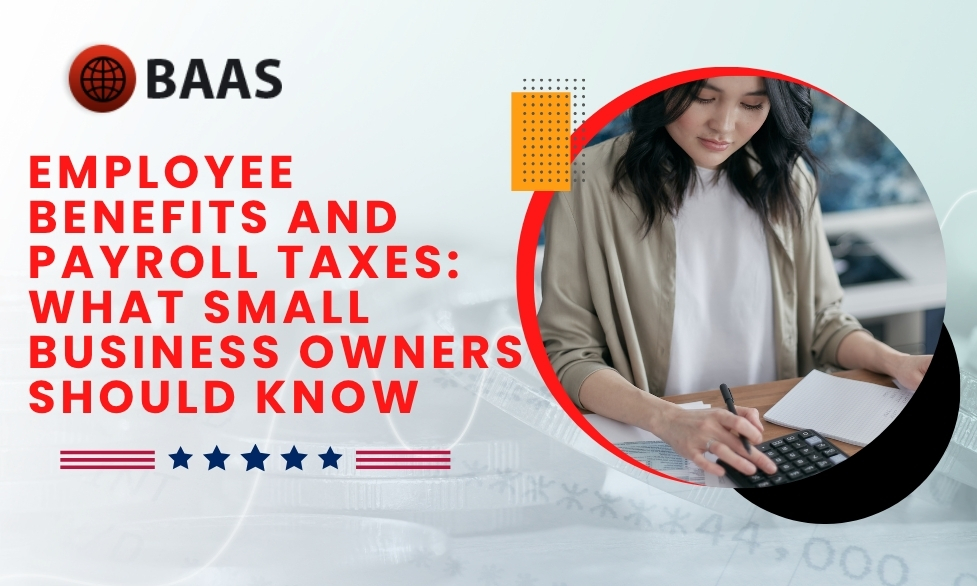Employee Benefits and Payroll Taxes: What Small Business Owners Should Know
Offering employee benefits is a powerful way to attract and retain talent, but small business owners in Fremont, San Jose, and the Bay Area must understand how benefits interact with payroll taxes. Mismanagement can lead to compliance issues, penalties, and unexpected costs.
This guide explains what small business owners need to know about employee benefits, payroll taxes, and best practices for staying compliant while maximizing employee satisfaction.
Why Employee Benefits and Payroll Taxes Matter
Employee benefits — including health insurance, retirement plans, and paid leave — often have tax implications for both employers and employees. Understanding these rules helps businesses:
- Remain compliant with IRS and California tax laws
- Avoid costly payroll errors
- Improve employee satisfaction and retention
- Optimize costs and tax deductions
Pro Tip: Treat benefits and payroll taxes as interconnected — decisions about one directly impact the other.
1. Common Employee Benefits and Tax Implications
Health Insurance
- Employer contributions for group health plans are generally tax-deductible.
- Employee contributions via pre-tax payroll deductions reduce taxable income.
- Employer must comply with reporting requirements under ACA and IRS Form 1095-C.
Retirement Plans
- Options include 401(k), SEP IRA, and Simple IRA.
- Employer contributions are deductible, and employee contributions via payroll are pre-tax.
- Plans may require specific reporting to IRS (e.g., Form 5500 for 401(k)).
Paid Time Off (PTO) and Sick Leave
- PTO and sick leave are taxable wages subject to Social Security, Medicare, and federal/state withholding.
- California law requires accrual and reporting of certain leave benefits.
Other Benefits
- Life insurance, disability insurance, commuter benefits, and FSAs/HSAs have specific tax treatment.
- Pre-tax deductions reduce payroll taxes for both employer and employee.
Pro Tip: Review all benefit plans annually to ensure compliance with federal and California laws.
2. Understanding Payroll Taxes
Payroll taxes include:
- Federal Income Tax withholding
- Social Security and Medicare (FICA)
- Federal Unemployment Tax (FUTA)
- State Income Tax withholding
- State Payroll Taxes (California Employment Development Department)
Key Point: Employer-paid benefits may affect taxable wages and payroll tax calculations.
3. How Benefits Affect Payroll Tax Liability
- Pre-tax benefits (like health insurance and retirement contributions) reduce taxable wages, lowering payroll taxes.
- Certain employer-paid benefits may be subject to payroll taxes if not properly structured.
- Taxable benefits must be included in employee W-2 forms.
Pro Tip: Consult a CPA or payroll professional to structure benefits in a tax-efficient way.
4. Compliance Checklist for Small Business Owners
- Review all employee benefits to understand payroll tax implications.
- Ensure accurate payroll deductions for pre-tax contributions.
- Report taxable benefits on W-2 forms accurately.
- Stay updated on federal and California labor and tax laws.
- Perform regular payroll audits to catch errors early.
Pro Tip: Maintaining clear records and automated payroll systems simplifies compliance and reduces audit risks.
5. Why Professional Payroll and Accounting Support Helps
Small business owners benefit from professional oversight to:
- Calculate payroll taxes accurately considering all benefits
- Ensure compliance with IRS and California reporting requirements
- Optimize tax deductions and reduce overall payroll costs
- Maintain employee satisfaction with accurate benefits administration
Pro Tip: Partner with a local accounting firm familiar with Bay Area payroll regulations for personalized support.
Why Small Businesses Choose Bay Area Accounting Solutions (BAAS)
At Bay Area Accounting Solutions, we help Fremont, San Jose, and Oakland small businesses manage employee benefits and payroll taxes with confidence. Our services include:
- Payroll processing and tax filings
- Employee benefits tracking and reporting
- Tax-efficient structuring of benefits
- Compliance with federal and California laws
Partnering with BAAS ensures your business remains compliant, reduces risk, and provides employees with the benefits they value.
Conclusion
Employee benefits and payroll taxes are closely linked, and mismanagement can be costly for small businesses. By understanding tax rules, maintaining accurate records, and working with professional accounting support, business owners can offer attractive benefits while staying compliant and minimizing tax liability.
Ready to streamline payroll and benefits management? Contact Bay Area Accounting Solutions today to ensure your small business stays compliant and financially optimized.
FAQ — Employee Benefits & Payroll Taxes
Q1: Are all employee benefits taxable?
No. Pre-tax contributions like health insurance premiums and retirement plans reduce taxable wages, while certain perks may be taxable.
Q2: How do benefits affect payroll taxes?
Pre-tax benefits reduce taxable income for employees and lower employer payroll taxes, while taxable benefits must be included in payroll calculations.
Q3: How often should payroll and benefits be reviewed?
Monthly or quarterly reviews are recommended, with annual compliance audits.
Q4: Do California state rules differ from federal rules?
Yes. California has specific regulations for leave, unemployment, and payroll taxes that must be followed alongside federal rules.
Q5: Should small businesses use a payroll service?
Yes. A professional payroll service ensures accurate tax calculations, compliance, and efficient benefits administration.



